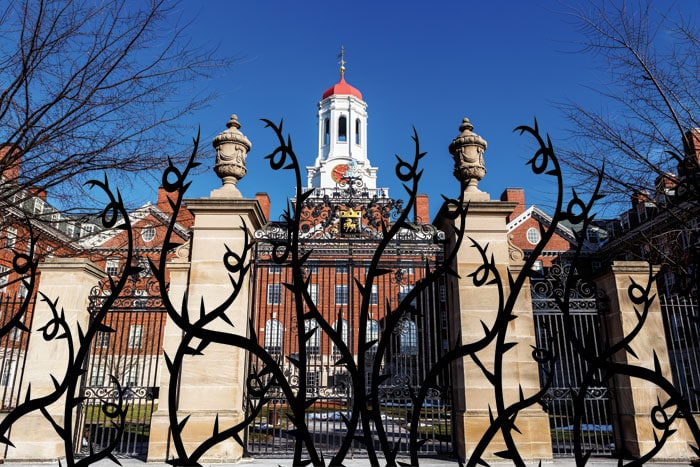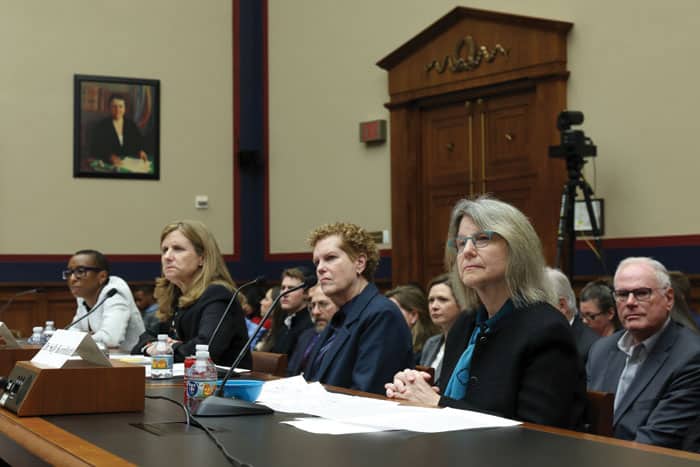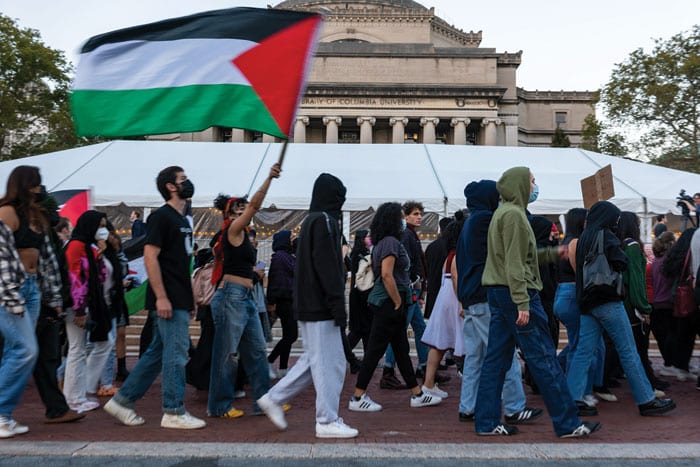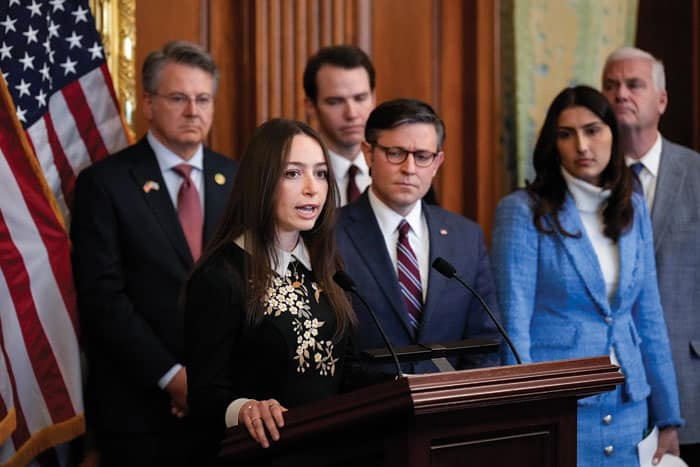 APCortizasJr/Getty Images
APCortizasJr/Getty Images Spectacle on The Hill
Witnessing the college presidents stumble and stammer in the recent congressional hearings was like watching an episode of “Curb Your Enthusiasm” in which Larry David becomes possessed by some peculiar hang-up that inevitably produces a cringe encounter late in the episode, exposing just how out of sync Larry is with polite society. These university presidents are similarly detached from how most Americans view the world, as they come from an alternative universe known as higher education that operates by an entirely different set of moral and intellectual attitudes, a worldview that implicitly sees Jews as a dominant group, undeserving of the same protections as other minority communities. Taken out of their natural habitat such perspectives make no sense to the average person watching hearings on TV and were bound to produce a Larry David moment.

So I braced myself when Congresswoman Elise Stefanik posed the penultimate question to the college presidents: Does calling for the genocide of Jews violate your university’s policies on bullying and harassment? And the university presidents fell right into the Congresswoman’s trap by providing staid arguments for free speech and “context” meant only to paste over the true reason for their toleration of genocidal chants—a strange double standard when it comes to Jews that any normal person would reject. The university presidents had undoubtedly been prepped by lawyers who apparently didn’t realize that a technical defense of free speech on First Amendment grounds would do nothing but expose the presidents’ hypocrisy for routinely suppressing free speech on their campuses. Did they not realize that most Americans know that these campuses are generally hostile to non-leftist viewpoints? New York Times columnist David French had it right when he said that “The rule cannot be that Jews must endure free speech at its most painful, while favored campus constituencies enjoy the warmth of college administrators and the protection of campus speech codes.”
The university presidents could have saved themselves by taking some responsibility and saying: “Despite our stated commitment to free speech, we’ve too often stifled expression that offends prevailing attitudes on campus. Now we come across as hypocritical when we don’t shut down antisemitic speech. In the future, we will uphold free speech for everyone.” Or they could have said: “We have strict policies against hate speech but we haven’t applied them consistently when it comes to antisemitic speech. From here on out, we will no longer tolerate genocidal chants any more than we will tolerate racist tirades against black and brown people.” Both approaches would have required that the presidents acknowledge their failure to apply consistent standards. And both would have sparked an all out revolt by faculty and student ideologues for defying their cherished dogma. I doubt that the presidents even considered such responses.
The problem with universities isn’t just mealy mouthed, hypocritical and morally bankrupt university presidents; it’s the university cultures that produce them and over which they preside.
In other words, the problem with universities isn’t just mealy mouthed, hypocritical and morally bankrupt university presidents; it’s the university cultures that produce them and over which they preside. And until we fix the larger problem—a long-term, generational challenge if there ever was one—we can expect only more prevarication and equivocation, more illiberalism and outright nuttiness, and more campus antisemitism, no matter who is at the helm.
Fighting Antisemitism Beneath the Surface
If we are serious about fighting against antisemitism on campus, which infects a wide array of American institutions and the larger body politic, we are going to have to counter the underlying ideology that produces the fetid campus culture in the first place. Campus hate is like an iceberg, with outward manifestations for all to see but beneath the surface there is a deep-seated ideology—the bummock of the iceberg—that undergirds what happens above water. And we can’t stop what happens above the surface if we don’t change what happens beneath it.
It’s hard to imagine that absurd ideological trends in the humanities departments at American universities could wreak such havoc. But that they have and here we are.
As challenging as it will be to affect such a shift in deeply entrenched attitudes, the stakes couldn’t be higher. If future generations of young elites continue to be educated into hostility toward Israel and Jews, we should expect to see a decline in U.S.-Israel ties with increasing pressure to end the special relationship, and greater support for radicalism and charges of genocide. It’s hard to imagine that absurd ideological trends in the humanities departments at American universities could wreak such havoc. But that they have and here we are.
Three trends converge in the emergence of today’s campus hate. The first is the emergence of postmodern and postcolonial studies in American universities. Postmodernism holds that all of what we consider “knowledge” and attribute to science and free discourse is really dictated by powerful interests encoding their preferred understanding of the world in social discourses so that they can continue to rule over society.
In the late 1960s, postmodern scholars with an activist agenda forced their way into higher education and established ethnic studies and other “Studies” departments in universities across the country; these studies did not adhere to usual standards of scholarly inquiry. Instead, these academic programs indoctrinated young people in “critical consciousness,” seeing systems of oppression all around them and in an imperative to disrupt and resist such hierarchy. These ideas gained further momentum through the writings of the Palestinian-American literary critic Edward Said, the founder of postcolonial thought. Said discredited the Western study of the Middle East and influenced a generation of scholars of the humanities to see Zionism as a colonialist project. Over time, particularly in the past decade, these ideas escaped “the lab” and worked their way into other institutions, particularly K-12 education. It should surprise no one that what was taught in the classroom eventually found its way into raucous protests on the campus quad and then into what teenagers are taught in high schools. These popular academic theories today see the world through a stark oppressed/oppressor binary, and are predisposed to keeping alive anti-Zionism and other such canards about white, Jewish and colonial power.

A second factor is the Soviet anti-Zionist campaign of the late 1960s. Wilson Center scholar Izabella Tabarovsky describes the development of a field called “Zionology” in the USSR that actively discredited Zionism. In the wake of the 1967 Six Day War, the Soviets were distressed that Israel had handily defeated their Arab allies, and that Soviet Jews, inspired by Israel’s victory, increasingly identified with the Jewish state. In 1969, a party official, Yuri Ivanov, wrote “Beware: Zionism!,” which sold upwards of 800,000 copies in the USSR alone. Tabarovsky explains that the Zionologists’ “most important contribution to global anti-Jewish discourse was to make antisemitic conspiracy theories, typically associated with the far right, not only palatable to the Western hard left but politically useful to it.” Less than a decade later, the UN passed the infamous “Zionism is racism resolution.” In other words, the Soviets successfully created the template for the anti-Zionist campaign we are seeing on American campuses today.
The third factor is the role of Middle Eastern money. In 2019, the Institute for the Study of Global Antisemitism and Policy (ISGAP) first presented research findings to the Department of Justice entitled “Follow the Money.” The research examined illicit funding of United States universities by foreign governments, foundations and corporations. The research revealed billions in Middle Eastern funding, primarily from Qatar, to U.S. universities that had not been reported to the Department of Education. A more recent ISGAP report lays out the way that Qatar is operating a war-chest with $500 billion-$1 trillion of assets, to affect soft power in the west including universities. Such funding has had a substantial impact on fueling antisemitic discourse, identity politics and anti-democratic sentiment within these institutions of higher education.
In other words, the ideological trends described above have been fomented by Qatari financing of American universities. A report issued by the National Association of Scholars, “Hijacked,” describes the problem: “The same leftist hysteria which has consumed the humanities and social sciences since the 1960s has spread to MESCs (Middle East Studies Centers) … Academics have repurposed critical theory to galvanize activism on Middle East issues. For instance, they have recast the Israel–Palestine debate as a fight for ‘indigenous rights’ against the supposed evils of colonialism.”
Adopting a Long-term Strategy
The American Jewish community has adopted a range of short-term responses to the crisis on campus. Among them are some that might reduce tensions including: exhorting university presidents to actively oppose radical voices and to discipline perpetrators who intimidate or accost Jewish students; enforcing Title VI anti-harassment laws against those who generate a hostile environment; banning Students for Justice in Palestine (SJP) chapters that cross the line and bully Jewish students. These interventions can help, but none will likely permanently lower the level of animosity from students and professors. Some interventions, like trying to accommodate Jewish concerns in existing campus Diversity, Equity and Inclusion (DEI) efforts, while tempting, may be downright counterproductive and merely reinforce the ill-bred ideological conditions that fomented the hostile sentiment in the first place.
Supporters of Israel and Jewish security in America and, indeed, all those concerned about the health of American democracy, need to mount a sustained effort to change the campus culture. Here’s what this involves:
One of the most important things these donors can do is to reinvest their philanthropy in new academic programs that specifically and explicitly elevate free inquiry and freedom of expression.
Recommit to the Liberal University
As stated above, university humanities departments have become riven with ideological academic programs that perpetuate notions of power and oppression that cast Jews and Israel as victimizers. It is probably impossible to get rid of these departments altogether but over time we can weaken their influence. Major Jewish donors have begun to withdraw their philanthropy from elite universities often run by weak-kneed presidents, such as those who gave testimony at the hearings. One of the most important things these donors can do is to reinvest their philanthropy in new academic programs that specifically and explicitly elevate free inquiry and freedom of expression. Yale Law School, for example, recently established a new free speech and academic freedom center. Such centers can begin to compete with the politicized “Studies” programs and attract superior faculty and student talent.

End or Transform DEI
Campus DEI bureaucracies function as an ideological authority, reinforcing political orthodoxies on campus. The National Association of Diversity Officers in Higher Education describes itself as “a leading voice in the fight for social justice” by “creating a framework for diversity officers to advance anti-racism strategies, particularly anti-Black racism, at their respective institutions of higher education.” Sprawling bureaucracies in major universities now have on average more than 40 paid staff members who reinforce the overall illiberal ideological environment. A 2021 study conducted by Jay Greene at the Heritage Foundation reviewed the social media output of campus DEI officers and found that a high percentage had hostile views toward Israel. One can only imagine what such a study would show today.
Bari Weiss, among others, argues that “it is time to end DEI for good.” “The answer,” she states, “is not for the Jewish community to plead its cause before the intersectional coalition, or beg for a higher ranking in the new ladder of victimhood. That is a losing strategy—not just for Jewish dignity, but for the values we hold as Jews and as Americans.” Another approach proposed by interfaith leader Eboo Patel is to replace DEI with a less ideological form of diversity built on the traditional American model of pluralism. New York Times columnist David Brooks argues that such an approach is more likely to succeed than an effort to do away with DEI altogether. Whether we try to ban it or change it, as long as the current model of DEI reigns supreme, we won’t be able to substantially shift university culture.
Cut Middle Eastern Sources of Funding
There is no reason that the U.S. must continue to allow foreign funding of American university programs.
There is no reason that the U.S. must continue to allow foreign funding of American university programs. In the aftermath of October 7, efforts to expose Qatari funding of American university programs have picked up steam. Hearings have been held on Capitol Hill detailing the failure of universities to disclose sources of funding. Now is the time to redouble such efforts. We should not forget that Saudi Arabia was once the major funder of anti-American academic programs but, under the scrutiny by lawmakers and the U.S. Administration, the Saudis largely pulled back. Qatar filled the vacuum. Like Saudi Arabia before it, Qatar has much at stake in its relationship with the U.S. Last year, the U.S. designated Qatar a major non-Nato ally, undoubtedly owing in large part to the role the Gulf state played as an intermediary with Iran. Until recently, however, the Biden Administration has shielded Qatar from scrutiny over its funding of universities. Turning up the heat on the Biden Administration to hold Qatar accountable will be critical.
Such a long-term, strategic approach to changing university cultures will not be easy. But unless we are successful in affecting such a change, the radicalism in the classroom, the genocidal chants, and the outrageous double standards will just continue and worsen.
David Bernstein is founder of the Jewish Institute for Liberal Values (JILV) and author of “Woke Antisemitism.”






















 More news and opinions than at a Shabbat dinner, right in your inbox.
More news and opinions than at a Shabbat dinner, right in your inbox.